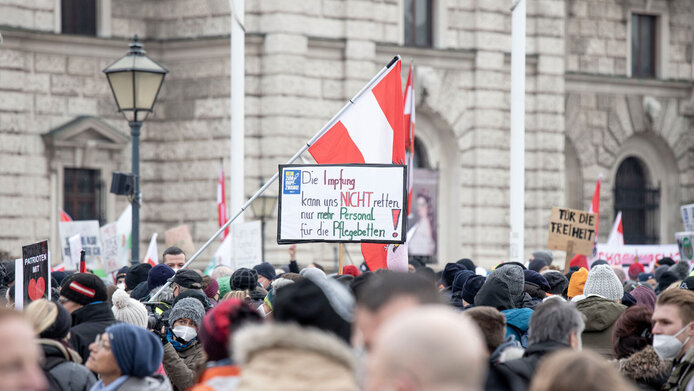European politics under the spell of conspiracy theories

The Covid-19 virus seen as the brainchild of a profiteering pharmaceutical industry; the pandemic as a first step towards an elite-driven authoritarian surveillance state; and vaccines as helpers for Bill Gates' secret plan to cull the world population: the uncertainty during the COVID-19 pandemic led to conspiracy theories that spread at an astonishing rate and gained a large following in all strata of society. The phenomenon even had an impact on political life. Right-wing populist parties in particular rewrote the myths to suit their agenda.
Novel in scale, this phenomenon quickly began to attract the attention of the science community. In 2022, before the end of the pandemic, the FWF-funded research project Populism and Conspiracy in the COVID-19 Pandemic was launched at the University of Salzburg in collaboration with the University of Lausanne. The project teams responded to the growing importance of myths of all kinds by expanding their focus to encompass climate change and immigration. “Until now, most explanations for why people believe in conspiracies have been provided by psychology and have been related to the US. Our project, on the other hand, is dedicated to political explanations that relate specifically to Europe,” says Reinhard Heinisch, political scientist at the University of Salzburg and initiator of the project, emphasizing the innovative nature of the research.
“Here in Salzburg we are investigating the mindsets of voters across Europe and the way conspiracy narratives become effective,” notes Heinisch. “Our colleagues in Lausanne, on the other hand, are investigating which conspiracy claims are taken up by right-wing populist politicians and how they are exploited for their own objectives.” It is no coincidence that the geographical focus of these studies is on Switzerland, Austria, Italy and France, since right-wing populist parties have long been shaping the political discourse in these countries.
Study on populism and conspiracy
One in five Austrians believes in secret powers in politics, on a par with Switzerland and more than in Germany (12%). This is the result of a study of four European countries in comparison. A surprising finding for the study authors was that differences in education are hardly relevant for affinity with conspiracy mentality.
“Here in Salzburg we are investigating the mindsets of voters across Europe and the way conspiracy narratives become effective,” notes Heinisch. “Our colleagues in Lausanne, on the other hand, are investigating which conspiracy claims are taken up by right-wing populist politicians and how they are exploited for their own objectives.” It is no coincidence that the geographical focus of these studies is on Switzerland, Austria, Italy and France, since right-wing populist parties have long been shaping the political discourse in these countries.
Suspecting clandestine groups of pulling the strings
Conspiracy mentality is a central concept in the project's survey research. In contrast to specific narratives, this refers to the degree of someone’s fundamental susceptibility to believing in the existence of clandestine groups that steer current developments. At the same time, it is also important to clearly distinguish between radical political stances and a tendency toward conspiracy narratives. “Fundamentally rejecting immigration and considering the government incompetent is not a conspiracy narrative. Talking about a plan whereby the government aims to replace the population with immigrants, however, most certainly is,” Heinisch illustrates.
In order to analyze the international electorate, the Salzburg researchers used a variety of data sources, including the European Social Survey, which regularly collects information on mindsets, values, and social developments in the EU. The findings for Austria show that around 20 percent of the population has a pronounced conspiracy mentality and therefore believes that there are shady goings-on in political and other developments. In a comparison between Austria's federal states, Carinthia (30 percent) and Salzburg (29 percent) are the frontrunners in this context.
Conspiracy mentality in a European comparison
In this respect, Austria is on a par with Switzerland, but the figure is higher than in Germany, where it was 12 percent. Scandinavian countries fare significantly better – Sweden, for example, with only 7 percent. In the Balkans, the figures are skyrocketing in some cases, in Macedonia, for instance, where over 60 percent tend toward conspiracy thinking. “Obviously, there must be political factors that explain these differences. The studies show that the degree of faith in democracy together with the prevalence of corruption correlate extremely strongly with conspiracy mentality,” notes Heinisch. Corruption and feeble democratic values prepare the ground on which misleading myths can flourish.
Educational differences hardly matter – but media do
It is astonishing to see that conspiracy mentality has little to do with social characteristics. “Gender makes scant difference, and there is also little variation as between the differing ages of the respondents,” Heinisch explains. “There is even a low correlation with the level of education. In this respect, the relationship is not linear, as one might assume: susceptibility is lowest among those with a high level of education, but it is also low among those with very little education.
It is highest in those with medium to upper levels of education. They are skeptical of elites, believe themselves capable of understanding complex issues, and promptly draw the wrong conclusions.” By far the highest correlation is among voters of radical parties – they are most likely to believe in conspiracy myths. The effect is not only evident among voters on the far right, but also, if to a lesser extent, among those on the far left.
Belief in conspiracy theories varies depending on the topic. Surveys conducted in Austria as part of the project show that willingness to believe in conspiracies is by far the highest when it comes to COVID-19. There is also a clear correlation with media consumption. “Those respondents who say they only watch private television channels also show the greatest agreement with conspiracy content. The values are lower in those who additionally consume public-service television,” Heinisch points out.
A radical message for populist parties
The success of right-wing populists has induced other parties to copy their strategies. Identity politics has increasingly become part of the political mainstream. “The adoption of conspiracy content by right-wing populist parties is also an attempt to maintain the radical nature of their narrative,” explains Heinisch. “In line with this pattern, the topics of COVID-19 and vaccinations featured strongly in Italy, Austria, and Germany, but much less so in France.
In Austria, where migration is a perennial issue, the FPÖ sent out very mixed messages on COVID-19 before ultimately adopting a consistent line.” Only in very rare cases are conspiracies articulated by right-wing politicians themselves. “Right-wing populists play with narratives such as that of the 'great replacement'. They make allusions and cater to narratives, but refrain from making any specific claims themselves,” explains Heinisch.
The results of the project contribute to a better understanding of susceptibility to conspiracy narratives. “Security is a crucial factor. We can provide indicators as to what different groups of people fear most and how best to communicate with them,” explains Heinisch. “Our political system is tied very much to individual politicians, and the basic question is how one can get through to people on an emotional level – and address their fears and concerns to some extent in counter-narratives to the conspiracies.”
About the researcher
Reinhard Heinisch is a professor of Austrian politics in a European comparative perspective at the University of Salzburg, where he headed the Department of Political Science from 2009 to 2024. From 1994 to 2009, he held a position at the University of Pittsburgh in the US. Since 2014, he has been teaching regularly at Renmin University of China in Beijing.
Heinisch has served as a political advisor to various government agencies and organizations, including the US State Department and the Austrian Ministry of Defense. He is also a frequent commentator on political developments in national and international media. Set to run from 2022 to 2026, the international WEAVE project “Populism and Conspiracy in the COVID-19 Pandemic,” receives EUR 432,000 in funding from the Austrian Science Fund FWF.
Publications
„Die da oben führen was im Schilde.“ Verschwörungsdenken in Deutschland und Österreich im Vergleich, 2024
Exploring the Extremes: The Impact of Radical Right-Wing Populism on Conspiracy Beliefs in Austria, 2024
Wie verbreitet ist die Verschwörungsmentalität in Österreich und welche Verschwörungsnarrative dominieren?, 2024





